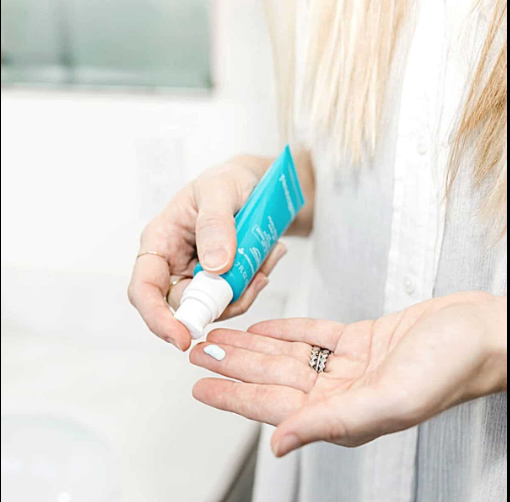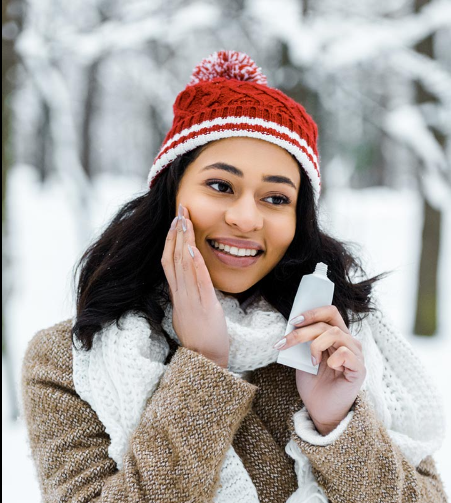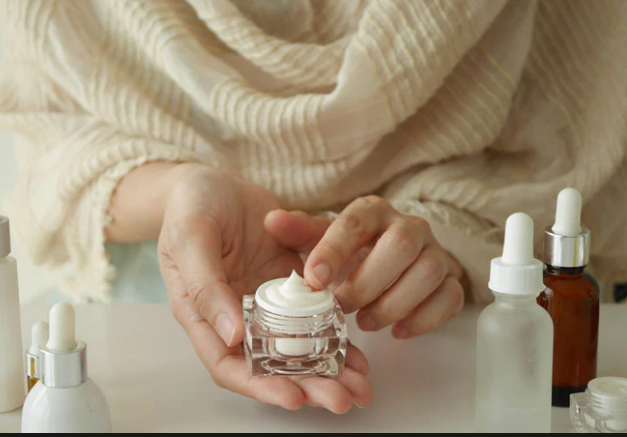The skin isn’t treated well by winter. Dryness is brought on by cold, dry weather, and you may even get “winter rash,” which is a rash of red, scaly, flaky, and burning dry skin. It’s therefore the perfect moment to intensify your skin care regimen.
The assistant professor of dermatology at Houston’s Baylor College of Medicine, Dr. Oyetewa Oyerinde, offered some advice on how to maintain radiant skin. “During the winter, our skin typically dries out because the air tends to be less humid, and we also use the heater indoors, which leads to even more dryness,” she said in a release from Baylor University. “Dry skin is more likely to develop many types of rashes.”
That’s why she recommends changing up your usual routine of daily cleansing, moisturing and sun protection. If you usually use lotion, consider using a thicker, cream-like moisturizer. If you usually use cream-like moisturizers, consider switching to an ointment-type moisturizer, Oyerinde suggested. If you enjoy outdoor activities or snow sports, don’t forget your sunscreen. Following a good skin care regimen will help prevent a winter rash, she said. Your lips and skin around the eyes are especially vulnerable, not only to the cold but also to rubbing caused by allergies, colds or the flu, she pointed out. Soothing irritated skin is easy. Just grab a jar of petroleum jelly and slather it on the affected areas. Petroleum jelly creates a thick moisture seal that will keep wind and cold from doing more damage.
Also read-Is A Combination Of Resistance And Cardio Exercise Better For Your Heart

Skin Care
Have dry, cracked lips? Petroleum jelly or lip balms containing hydrocortisone may help. Oyerinde noted that dry weather can also cause harsher symptoms for people who have eczema, psoriasis or other rashes. Allergy flare-ups can sometimes lead to hives or other skin rashes. Kids are especially likely to have eczema flare-ups during the winter, while older adults may experience skin irritation more often because their skin is dryer to start with. Oyerinde, director of Baylor’s Skin of Color Clinic, noted that people with darker skin tones are more likely to develop dark spots after having rashes. Wearing sunscreen can help prevent it.

Skin Care
There is one plus to winter, she said: If you’re considering a skin procedure, this may be a good time to schedule it. “Laser procedures, such as laser hair removal, are often best done in the winter,” Oyerinde said. “For most laser procedures, the skin must be completely free of a tan and people tend to spend less time outside due to the cold weather.” Other procedures, like Botox or fillers, are often performed in the winter so the changes will be evident in the summertime. That, Oyerinde said, is “when patients really want all their cosmetic treatments to shine.”

Skin Care
As temperatures dip, check your products for these skin-saving ingredients
Cold air outside, hot air inside, and dry air everywhere can disrupt the skin’s barrier in the winter. And that can mean dry, itchy skin for everyone, but especially for those who deal with conditions like eczema and psoriasis. Here are some products that can help your skin look and feel its best throughout the colder months. Some of the ingredients are tried-and-true skin superstars, while others are relatively new additions to the winter skin care arsenal.

Skin Care
Facial cleanser
“You want to make sure your cleanser puts moisture into the skin rather than taking it out,” says Joyce Davis, MD, FAAD, a board-certified dermatologist practicing in New York City.
Look for products that specifically say “gentle” and “moisturizing” on the label. Avoid products that contain alcohol, as these can dry your skin.

Skin Care
Facial moisturizer
Lighter lotions may not be enough to protect your skin from the elements in colder, drier climates.
Look for creams, oils, or balms. “Hyaluronic acid is popular lately,” says Robert Anolik, MD, FAAD, a board-certified dermatologist in private practice in New York City. This ingredient is moisturizing rather than exfoliating, like other acids such as glycolic or salicylic acid. “Jojoba oil is another good hydrating ingredient. Notably, some lactic acid moisturizers are able to walk the fine line of exfoliating dry, flaky skin while helping to maintain skin hydration.”

Skin Care
Body moisturizer
Moisturizing your body while your skin is still damp after a shower or bath is an effective way to keep your skin hydrated. This is because moisturizer traps existing moisture in the skin. Why not use the same moisturizer on your face and body? Facial skin is thinner and more sensitive, so many face moisturizers are designed to be a bit thinner and less likely to cause acne. They may also have more expensive anti-aging ingredients added to them. Keep in mind that more expensive skin care products are not necessarily more effective.

Look for ointments and creams that you squeeze from a tube or scoop from a tub, as opposed to ones you pump from a bottle, as thicker formulations typically pack more moisture. Hyaluronic acid is recommended because it works as well for the body as it does for the face. “Using hyaluronic acid in body products is new,” says Dr. Davis. “Hyaluronic acid absorbs 1,000 times its weight in water, but until recently it was primarily used in products for the face.” Other ingredients that work well for dry skin are glycerin, lanolin, mineral oil, petrolatum, and shea butter.

Also read-Global Life Expectancies May Drop By Half A Year Due To Climate Change
images source: Google
Disclaimer: The opinions and suggestions expressed in this article are solely those of the individual analysts. These are not the opinions of HNN. For more, please consult with your doctor




































